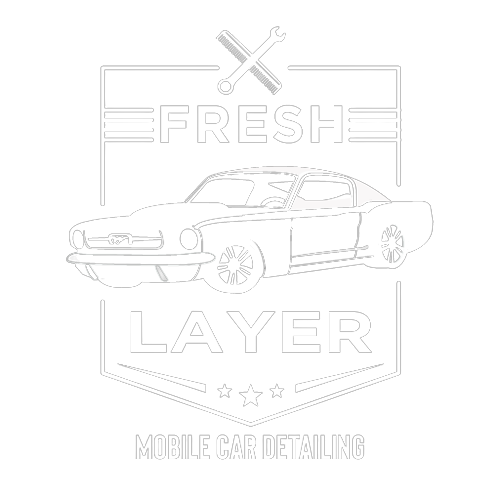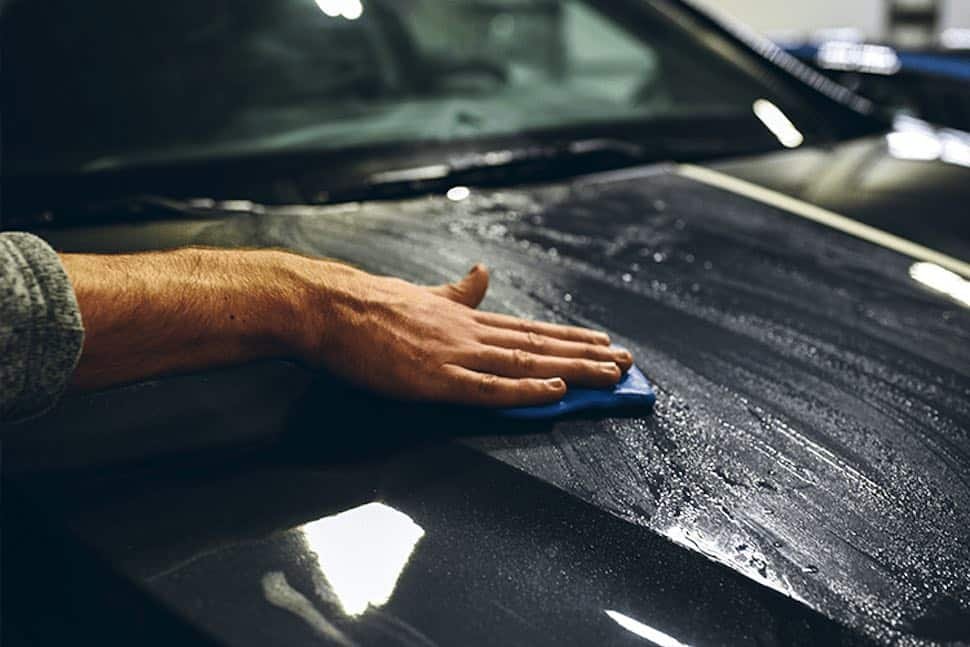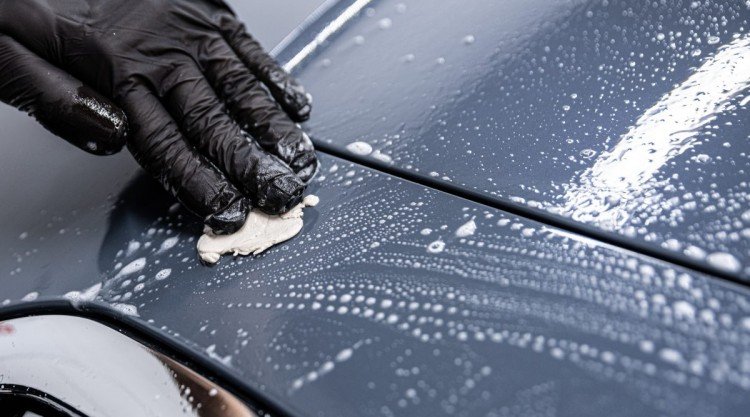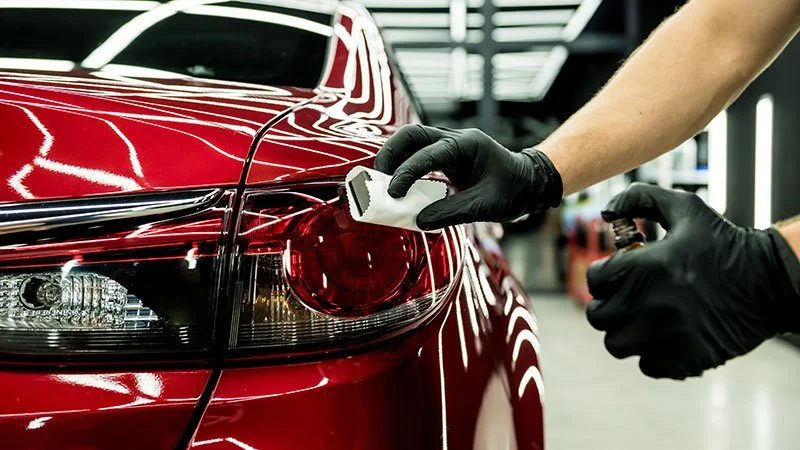Why Every Car Enthusiast Needs a Clay Bar
If you’re serious about car detailing, you already know that achieving a flawless finish goes beyond just washing and waxing.
Contaminants like tar, industrial fallout, and tree sap embed themselves into your car’s paint, making it rough and dull.
Enter the clay bar—a revolutionary tool designed to remove these impurities, leaving your car’s surface smooth and ready for polishing or waxing.
What is Clay Bar Treatment and Why is it Important?
As a professional auto detailing, We can confidently say that proper care of your car's exterior is crucial if you want to keep it looking new.
Leaving in San Diego its nice but we also have a lot of UV raise, ocean salt and many more factors what’s can damage your paint. One of the most effective ways to restore your car's shine is through clay bar treatment.
This process involves using a specialized clay bar treatment to gently lift and remove contaminants like dirt, debris, and industrial fallout from the surface of your car's paint.
Keeping your car's exterior in pristine condition can be a challenging task, especially with contaminants like dirt, grime, and industrial fallout adhering to the paint.
Clay bars are essential tools in car detailing that help remove these embedded contaminants, restoring your vehicle's smooth, glossy finish. In this comprehensive guide, we will explore the best five clay bars on the market, highlighting their features, benefits, and why they stand out.
What are the Types of Clay Bars?
A clay bar is a synthetic resin compound designed to remove contaminants from your car's paint, glass, and metal surfaces. These contaminants, which include tree sap, industrial fallout, and road grime, can bond to the surface and are not easily removed by washing alone.
Using a clay bar helps achieve a cleaner, smoother surface, preparing it for polishing and waxing.
They are also less likely to break or crumble during use, making them a popular choice among car detailing professionals.
The Best 5 Clay Bars on the Market in 2025
Traditional Clay Bar
Why It’s a Game-Changer:
Adam’s Clay Bar Kit is designed for detailers who demand precision. It’s ideal for light to moderate contamination, ensuring your car’s surface is ready for sealants or coatings.Key Features:
Two clay bars (100g each).
Includes Adam’s Detail Spray for smooth application.
Leaves no residue or streaks.
Fun Fact: Adam’s is a favorite among detailing hobbyists for its user-friendly products.
Description: A clay mitt combines a microfiber mitt with a synthetic clay material on one side. It offers the same benefits as a traditional clay bar but covers a larger surface area and can be easier to handle.
Usage: The mitt is worn on the hand, providing better control and reducing the risk of dropping it. Like traditional clay, it requires lubrication for smooth operation and is suitable for both professional detailers and DIY enthusiasts.
Description: A clay towel is similar to a clay mitt but in the form of a towel. It features a microfiber towel with a layer of synthetic clay material attached to one side. Clay towels are durable, easy to use, and can be cleaned and reused multiple times.
Usage: Perfect for quick and efficient decontamination of large areas. The towel format allows for easy handling and storage. It should be used with a lubricant to ensure it glides effortlessly over the surface, minimizing the risk of marring.
Description: Synthetic clay bars are made from engineered rubber or polymer materials designed to mimic the contaminant-removing properties of traditional clay bars. They are usually more durable and can be easier to maintain than their traditional counterparts.
Usage: Works similarly to traditional clay bars but often comes in a form that's easier to grip and manipulate. Synthetic clay bars are less likely to crumble or require as much kneading. They are also washable and reusable, offering a cost-effective alternative to traditional clay.
Why It’s a Top Choice:
Meguiar’s has been a trusted name in car care for decades, and their Smooth Surface Clay Kit is no exception. This kit includes everything you need to restore your car’s shine, including a quick detailer spray for lubrication and microfiber towels.
Key Features:
Removes embedded contaminants like brake dust and tar.
Gentle on all paint types.
Comes with two 80g clay bars for multiple uses.
Customer Review:
“After using Meguiar’s, my car feels like glass—it’s the perfect prep for waxing!”
On the other hand, natural clay bars are made from a combination of clay and abrasives, which can provide a more aggressive cleaning action.
This makes them ideal for heavily contaminated surfaces that require more intensive cleaning. However, natural clay bars can be more fragile and prone to breaking, which can make them more challenging to work with.
Ultimately, the choice between synthetic and natural clay bars comes down to personal preference and the specific needs of your vehicle. A professional detailing expert can help you determine which type of clay bar is best suited for your car's unique needs.
Types of Clay Bars
There are several types of clay bars available, each with its unique benefits and uses:
Traditional Clay Bar
The traditional clay bar, a malleable, resin-based compound, is versatile in its use. It can be applied to a vehicle's paint, glass, and metal, effectively removing surface contaminants.
Available in various grades (fine, medium, and heavy), it can handle different contamination levels.
To use, it needs to be kneaded into a flat shape and should be used with a lubricant to glide over the vehicle's surface, picking up contaminants. While effective, it can be time-consuming and requires careful handling to avoid dropping and contaminating the clay.
Clay Mitt
The clay mitt, a combination of a microfiber mitt and a synthetic clay material, offers the same traditional clay bar with added convenience.
It covers a significant benefit as a water surface area. It is easier to handle, as it is worn on the hand, providing better control and reducing the risk of dropping it. Like traditional clay, it requires lubrication for smooth operation and is suitable for both professional detailers and DIY enthusiasts.
Clay Towel
A clay towel is similar to a clay mitt but in the form of a towel. It features a microfiber towel with a layer of synthetic clay material attached to one side.
Clay towels are durable, easy to use, and can be cleaned and reused multiple times.
They are perfect for quick and efficient decontamination of large areas. The towel format allows for easy handling and storage. It should be used with a lubricant to ensure it glides effortlessly over the surface, minimizing the risk of marring.
How to Use a Clay Bar: Step-by-Step Guide
Step 1: Wash Your Car
Start with a thorough wash to remove loose dirt and debris.
Step 2: Prep the Clay Bar
Tear off a small piece and knead it into a flat shape.
Warm it up in your hands for better pliability.
Step 3: Apply Lubricant
Spray a generous amount of clay lubricant or detailer spray onto a small section of your car.
Step 4: Glide the Clay Bar
Gently rub the clay bar over the lubricated surface in straight motions.
You’ll feel the clay picking up contaminants; stop when the surface feels smooth.
Step 5: Wipe Clean
Use a microfiber towel to remove excess lubricant and inspect the area.
Step 6: Repeat
Continue section by section until the entire car is clayed.
Step 7: Protect the Paint
Follow up with waxing, polishing, or applying a ceramic coating for lasting protection
How Often Do You Need Clay Bar Treatment?
Living in San Diego, where the climate is warm and sunny, means that your car is more susceptible to damage from the environment. The salty sea air, sand, and dust can quickly accumulate on your car's surface, causing it to look dull and faded.
To maintain your car's appearance and protect its paint, it's recommended to have it clay barred at least twice a year, especially if you park it outside. If you keep your car garaged or covered, you may be able to stretch the intervals to once a year.
It's important to note that the frequency of clay bar treatment depends on various factors, such as your driving habits, the area you live in, and how often you wash your car. By consulting with a professional detailing expert, like Fresh Layer Mobile Detailng you can develop a personalized car detailing plan that suits your needs and helps keep your car looking new.
Real-Life Scenarios: When to Use a Clay Bar
1. Before Waxing or Polishing
Clay your car before applying wax or polish for optimal adhesion and shine.
2. After a Road Trip
Long drives often leave your car coated in road tar, bugs, and other debris. A clay bar is perfect for restoring its smooth surface.
3. Seasonal Maintenance
Spring and fall are ideal times to clay your car, removing buildup from winter salt or summer pollen.
What is the Next Step After Clay Bar Treatment?
Clay bar treatment is a crucial step in restoring your car's shine and removing contaminants from the surface. However, after the treatment, it's vital to take further steps to protect your car's paint and maintain its appearance.
The next step after clay bar treatment is to apply a wax, ceramic coating or sealant to the surface. A wax or sealant provides an additional layer of protection against the harsh environment and helps maintain the shine of your car's paint.
It creates a barrier between the surface and any contaminants, preventing them from adhering to the paint.
When it comes to wax or sealant options, there are various products available on the market. A professional detailing expert can help you choose the best option for your car's needs. Some products, like ceramic coatings, provide long-lasting protection and require less maintenance than traditional wax or sealants.
By applying a wax or sealant after clay bar treatment, you can ensure that your car's paint remains protected and looks great for longer. It's an essential step in maintaining your car's appearance and prolonging its lifespan.
What is the Difference Between All Clay Bars?
When it comes to clay bars, there are two types available in the market: synthetic and natural. Synthetic clay bars are made of a polymer compound and are less aggressive than natural clay bars, which are made from a combination of natural materials, such as clay and abrasives.
The level of aggressiveness of a clay bar determines its effectiveness in removing contaminants from your car's paint. Synthetic clay bars are a good option for frequent use as they are less likely to cause damage to your car's paint.
However, if your car's paint is heavily contaminated, a natural clay bar may be more effective in removing the contaminants.
It's essential to note that not all clay bars are created equal, and the quality of the clay bar can vary significantly. Cheap, low-quality clay bars can contain contaminants that can scratch your car's paint or leave behind residue that is difficult to remove.
It's essential to use high-quality clay bars that are safe and effective for all types of car paints.
At Fresh Layer Mobile Detailing, we use only the highest quality clay bars to ensure that your car's paint is protected and restored to its original shine. Our detailing experts can determine the best type of clay bar for your car's needs and ensure that the process is done safely and effectively.
Factors to Consider When Choosing a Clay Bar
Selecting the right clay bar for your car involves considering several factors:
Grade
Clay bars come in various grades (fine, medium, heavy) and are suitable for different contamination levels. Fine grade is ideal for light contamination, medium for moderate, and heavy for severe contamination. Choosing the appropriate grade ensures effective cleaning without damaging the paint.
Kit vs. Individual Bar
Kits often include lubricants and towels, making them convenient for beginners. Individual bars might be more cost-effective if you already have the necessary accessories. Kits are usually a good starting point for those new to clay bar treatment.
Brand Reputation
Established brands like Chemical Guys, Meguiar’s, and Mothers are known for their quality and reliability. Investing in a reputable brand ensures you get a safe and effective product for your car's paint.
Price
When it comes to the price of a clay bar, it's important to strike a balance between quality and cost. Higher-priced options often provide better value in terms of effectiveness and durability. However, there are affordable options that also perform well. By finding the right balance, you can select the best clay bar for your needs.
Q&A About Clay Bar
-
Yes, clay bar treatment is a safe and effective way to remove contaminants from your car's paint. However, it's essential to use the right technique and products to prevent damaging the clear coat.
-
Yes, you can do clay bar treatment at home, but it's important to use the right products and technique. If you're unsure, it's always best to have a professional do it for you.
-
The time it takes to clay bar a car depends on the size and condition of the vehicle. Typically, it takes 1-2 hours to clay bar a car.
-
No, a clay bar will not damage your paint if used correctly with proper lubrication. It’s designed to be gentle yet effective.
-
While not mandatory, polishing after claying can enhance the paint’s shine and smoothness, preparing it for waxing or sealing.
Conclusion: Choose the Best Clay Bar for Your Car
A clay bar is an essential tool for anyone serious about car care. Whether you’re prepping your vehicle for waxing, polishing, or ceramic coating, using one of the best clay bars on the market ensures your car looks and feels its best. From Meguiar’s all-in-one kits to Adam’s user-friendly solutions, there’s a clay bar here for every need and skill level.
So don’t wait—upgrade your detailing routine today with a top-rated clay bar and enjoy a smoother, shinier ride that turns heads wherever you go.



















